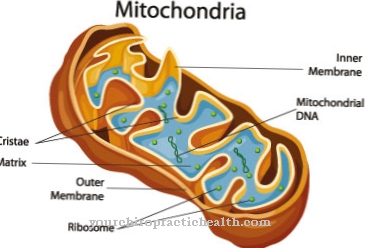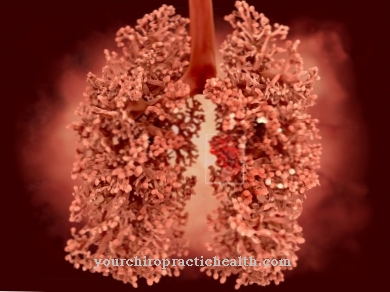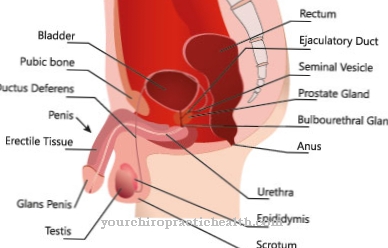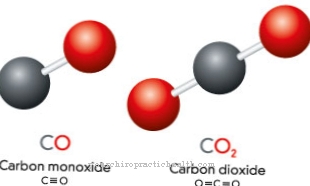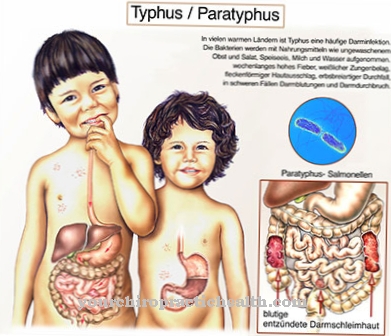In contrast to a calcium deficiency, one is Hypercalcemia or. Hypercalcemia an increased level of calcium in the blood. In order to avoid more far-reaching disorders, it is advisable to consult a doctor for further diagnosis and treatment.
What is hypercalcemia?

© rainbow33 - stock.adobe.com
The Hypercalcemia is defined as a high level of calcium in the blood. Values of more than 2.7 mmol / l in humans for the total calcium in the bloodstream are decisive here. In the case of ionized (free) calcium, a value above 1.3 mmol / l is referred to as hypercalcemia.
There is talk of a downright calcemic crisis when the total value has risen above 3.5 mmol / l. Then there is a polyuria (greatly increased urine excretion), vomiting, dehydration, fever and psychosis. Ultimately, it can lead to a coma.
causes
The disorder of calcium metabolism can have many causes: The most common causes are malignant tumors, mostly bronchial carcinoma, breast cancer and so-called multiple myeloma, a cancer of the bone marrow.
Second would be that osteolytic hypercalcemia to call. This is especially the case with bone metastases and plasmacytomas. The cancer cells release substances that have an increasing effect on the calcium metabolism.
Third, there is paraneoplastic hypercalcemia. It is caused by peptides that are similar to parathyroid hormone. These peptides are produced by tumors. About 90% of all patients with this form of hypercalcaemia have such peptides in their blood, whether they have bone metastases or not. In dogs, hypercalcemia most commonly occurs in tumors of the anal glands.
Another cause is hyperparathyroidism, which affects around 20% of hypercalcaemia patients. Adrenal insufficiency (Addison's disease), hyperthyroidism (overactive thyroid gland) and multiple endocrine neoplasia (MEN) are also possible causes.
Symptoms of intoxication continue the range of factors that could result in hypercalcemia. Above all, this includes poisoning with vitamins, in other words, excessive doses of certain vitamins, especially vitamins A, D and D3.
It should be noted that, unfortunately, high amounts of these vitamins are unnecessarily found in ready-made and supplementary feeds for dogs and cats. Overdosing is therefore rather rare in humans.
Intoxication from tamoxifen and certain diuretics can, at least temporarily, be responsible for excessively high calcium levels in the blood. Furthermore, an increased supply of lithium, calcium-containing ion exchangers, teriparatides and theophylline. Immobilization also leads to hypercalcemia, which means resting certain parts of the body (leg in plaster of paris) or bed rest.
Other causes that do not have a significant percentage of the weight:
- Sarcoid (these are lumps of tissue, usually in the lungs).
- Hypercalcemia as a result of a kidney transplant. Temporary renal insufficiency may have caused the parathyroid to become overactive.
- In addition, an overdose of calcium, for example through a high consumption of dairy products or an excessive intake of supplements.
- Hereditary hypercalcaemia due to insufficient calcium excretion by the kidneys.
- Acromegaly (a growth disorder caused by overproduction of growth hormone).
- Pheochromocytoma (a growth in the adrenal gland that can be malignant or benign).
- Hypophosphatasia (an extremely rare hereditary disorder of bone metabolism).
Symptoms, ailments & signs
The symptoms of hypercalcaemia depend on the level of calcium in the blood. Usually unspecific symptoms occur that also occur with other diseases. Therefore, hypercalcemia is often discovered by chance during an examination. If there is only a slight excess of calcium, often no symptoms at all are observed.
Otherwise the disease is characterized by a multitude of different complaints that can affect the heart, kidneys, digestive system, nervous system and muscles. This can lead to cardiac arrhythmias. In addition, the body often reacts with nausea, vomiting, constipation and loss of appetite. Kidney stones and calcium salts can build up in the kidneys.
The kidney stones can both remain silent and lead to renal colic. Furthermore, there is often an increased excretion of urine combined with a strong feeling of thirst. If the muscles are involved, muscle weakness develops with a decrease in general performance. When the nervous system is affected, drowsiness or even impaired consciousness is common.
Furthermore, the development of a so-called organic brain syndrome with behavioral problems, memory disorders, anxiety states, lack of interest and fatigue is possible. If the calcium level exceeds 3.5 millimoles of calcium per liter of blood, a life-threatening hypercalcemic crisis occurs.
The hypercalcemic crisis develops within a few days and, in addition to nausea and vomiting, is also characterized by severe cardiac arrhythmias, fever, desiccosis (dehydration), increased fluid loss due to polyuria and impaired consciousness up to coma. A hypercalcemic crisis leads to death 50 percent of the time.
Diagnosis & course
The symptoms are absent in half of all patients Hypercalcemia. Often the phenomenon is discovered only by chance during a blood test. Otherwise, the symptoms of the underlying illness and increased water excretion, nausea, constipation, vomiting, sometimes pancreatitis, cardiac arrhythmias, listlessness, muscle weakness, extreme drowsiness, psychosis and coma appear.
The diagnosis is primarily made via a laboratory test of the blood and a search for causal parameters, e.g. after tumors and an examination of parathyroid hormone, calcitriol and PTHrP levels.
Complications
The excess of calcium in the body can cause various complaints and complications for the patient. In order to avoid long-term damage, a doctor should always be consulted. In most cases, a clear diagnosis cannot be made for a relatively long time, since the hypercalcemia does not show any clear symptoms and symptoms.
Usually there is frequent urination and the person suffers from vomiting and nausea. In some cases, it can lead to heart problems, so that the person concerned is no longer resilient and usually feels exhausted and listless. There is also a general feeling of illness and a general feeling of weakness.
The muscles are also weak and can no longer be used in the usual way. It is not uncommon for constipation to occur. The complaints can limit and complicate the everyday life of the patient extremely. Treatment of hypercalcemia is always based on the causes of the disease. As a rule, acute emergencies can also be treated with the help of solutions and infusions. There are no further complications.
When should you go to the doctor?
Hypercalcemia does not always produce clear symptoms. A doctor should be consulted if increased water excretion is noticed. Frequent urination is often associated with nausea and vomiting, constipation, and fatigue. If you experience these symptoms, seek medical advice. At the latest when signs of cardiac arrhythmias or muscle weakness are noticed, the complaints must be taken to the family doctor.
If the calcium excess is left untreated, it can lead to circulatory collapse or even a heart attack. That is why a doctor should be called in at an early stage who can clarify the symptoms and, if necessary, treat them before serious complications set in. In the event of a circulatory collapse or any other medical emergency, the emergency doctor must be called. The affected person needs immediate medical treatment and must then be treated in hospital. In the case of hypercalcaemia, a general practitioner or internist is usually called in. If the bones are involved, an orthopedic surgeon must be involved. The initial diagnosis can be made by the family doctor.
Doctors & therapists in your area
Treatment & Therapy
The therapy tries to eliminate the causes. For example, by surgical removal of a tumor. Otherwise, try to stop dietary calcium intake as much as possible.
Acute symptom control can be achieved by supplying a physiological saline solution and furosemide and simultaneously initiating water excretion.
In the presence of tumors, bisphosphonates can be given to limit the function of the osteoclasts. In addition, the administration of glucocorticoids can be helpful because they work against vitamin D. Dialysis is also an option if you have kidney failure. The hormone calcitonin can be administered as an emergency measure to lower the calcium level very quickly.
You can find your medication here
➔ Medicines against nausea and vomitingOutlook & forecast
In the case of hypercalcemia, the prospect of a cure depends on the cause of the excess supply of calcium in the organism. In severe cases there is a tumor disease. If this can be removed successfully and no metastases form in the body, there is a prospect of a cure for the hypercalcemia. If an aggressive tumor is diagnosed that cannot be adequately treated, the hypercalcemia will be present for the life of the patient. In these cases, severe symptoms of the affected person are treated, but no attempt is made to cure the side effects.
In less dramatic cases, a change in food intake can result in significant relief of the symptoms and a cure. With a balanced and healthy food supply there is a continuous depletion of the excess calcium until a complete normalization occurs. Permanent healing is possible if the elaborated diet is also used over the long term.
In acute health conditions, an infusion can reduce the calcium level. However, this is not a permanent measure that results in freedom from symptoms. There is only a removal of the current calcium content in the organism. Without treatment of the cause, the nutrient will then be regenerated and the symptoms will relapse immediately.
prevention
One can prevent it Hypercalcemia only to a limited extent, as it can be a side effect of several other diseases. One possibility is to largely avoid the intake of calcium and vitamin D3 with food. However, this should only be done after consulting a doctor, as these substances are also vital.
Aftercare
In most cases, the affected person has no special follow-up measures available for hypercalcaemia. The disease must first and foremost be recognized and treated correctly and above all at an early stage by a doctor so that there are no further complications and no further worsening of the symptoms.
In most cases, dietary intake can be controlled so that the sufferer needs to adjust their diet properly. The doctor can also help and create a nutrition plan for the person concerned. The affected person should also consume plenty of water in order to excrete the excess calcium. After successful treatment, care should be taken not to re-trigger the hypercalcaemia.
The reason for the hypercalcemia should also be identified so that the disease cannot recur. In severe cases or in the case of severe poisoning, medication can also be taken to lower the level of calcium. With rapid treatment, the hypercalcemia does not reduce the life expectancy of the person affected.
You can do that yourself
Hypercalcemia can have very different causes and is not diagnosed by the patient himself. It usually comes to light when examining blood values, which is part of another diagnostic procedure. First and foremost, it is important to find out what causes the hypercalcemia are present in order to be able to choose a correct and appropriate form of therapy. The patient cannot contribute too much to this, but he can accelerate the process with his willingness to cooperate and to answer questions precisely.
The patient contributes to his recovery by trusting and following the therapy plan and the advice of his treating doctor. If there are deviations, he should report them to the doctor as soon as possible, as well as any other peculiarities that occur to him.
At the same time as the therapy, the patient can support his recovery through a lifestyle that is as healthy and stable as possible. Sufficient sleep and occasional rest breaks during the day support balance and a good general condition. The reduction of obesity and the adaptation of eating habits to a healthy and balanced diet also contribute significantly to improving health. If the overall condition allows, a moderate sport and exercise program is also very beneficial for the condition and the cardiovascular system. Basically, the better the general condition, the better the chances of a cure.

.jpg)
